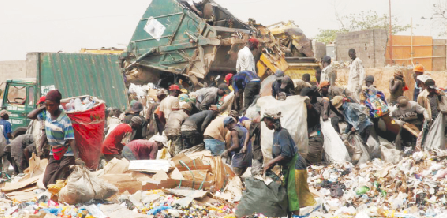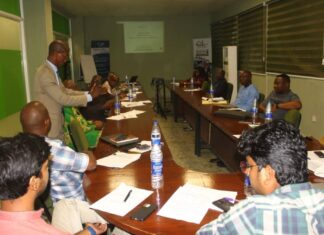Investors are optimistic that a crackdown on corruption by President elect, Muhammadu Buhari, will stimulate investment and boost growth in Nigeria’s oil-dominated economy.
With it comes the hope of improvement in living standards.

For Buhari, who has exceptionally conquered the base human instincts of greed and graft, many believe that his government will effectively deal with the fallout from a dive in global oil price in the past eight months which has hammered state revenues and forced two de facto currency devaluations.
“He’s a man with a strong sense of mission and he has clear ideas about what he wants to do with Nigeria, on corruption, on restoring national discipline,” British High Commissioner, Andrew Pocock, told BBC radio.
For analysts, the ripple effects of greed and graft have exacerbated more deaths in Nigeria than the casualty figures of a decade of civil unrest and insurgency.
Millions have died from hunger, diseases, and minor health challenges that would have been cured if government resources had been properly channelled.
Buhari has promised to “spare no effort” to defeat Boko Haram and tackle graft in Africa’s largest economy.
The 72-year-old retired general, who first came to power three decades ago via a military coup and campaigned as a born-again democrat, won the election with 15.4 million votes against President Goodluck Jonathan’s 13.3 million.
He first took power in a coup in December 1983 only to be overthrown 18 months later by Ibrahim Babangida. Buhari subsequently embraced democracy, running in all the presidential elections since 2003, and despite losing, always bouncing back.
The ascetic former military ruler built his stunning electoral landslide on promises to clean up Nigeria’s notoriously filthy corruption and get tough on the Boko Haram insurgency raging in the northeast.
He returned to those themes in his first official speech as president elect, stressing zero tolerance for corruption and determination to quash the Islamist militants who have killed thousands in the North East.
The import of Buhari’s victory in Africa’s biggest economy, under pressure from the collapse in oil price, is gleaned from the performance of the financial markets a day after he was pronounced victorious.
The stock market leapt more than 8 per cent. Bonds climbed, while the naira, which has lost 20 per cent of its purchasing power in two devaluations since November 2014, gained 0.5 per cent on the black market to N217 to the dollar.
The local currency remains fixed at N197 to the dollar in official interbank trade after it was twice devalued by mid February this year.
The Buhari turf has served as a good lesson in Nigeria where, in the conduct of daily life, many now join the bandwagon of corruption, with the slogan that “if you can’t beat them, then join them” whether in politics or business.
Buhari’s strong character has taught everyone that consistency in moral and discipline is inestimable quality we should possess and demonstrate.
Unlike the usual Nigerian, he did not join the ruling Peoples Democratic Party (PDP) after he lost three times to its candidates. He did not stoop low in search of contracts from the government which would have gladly obliged.
Instead, he remained steadfast in his ultimate quest for the Presidency because he has a mission to effect change. But time will tell whether he actualises his mission. “I ask that we all be circumspect, respectful and peaceful …. We must begin to heal the wounds,” he said in his victory speech.
However, Buhari inherits an economy decelerating sharply from the 7 per cent annual growth to which it has become accustomed, to about 5.6 per cent. Foreign reserves have dropped by a third in the past year to below $29.9 billion.
Two weeks ago, Standard and Poor’s cut Nigeria’s credit rating, and Fitch lowered its outlook on the eve of the polls. Both moves will increase government’s borrowing costs.
Plans to source for 4 per cent interest, five year tenor loan of $2 billion from the World Bank and the African Development Bank (AfDB) under the 2012-2015 External Borrowing Plan to implement the 2015 budget has already been concluded.
“We have entered negotiations with international financial institutions – that is, specifically, the African Development Bank and World Bank.
“They have some resources for us already programmed, which is in the borrowing plan. We have asked them to turn these resources into budget support for us .… We are negotiating for $2 billion that will come in foreign exchange,” said Finance Minister and Coordinating Minister for the Economy, Ngozi Okonjo-Iweala.
Buhari will have few options but to cut Nigeria’s cloth to a more appropriate size. “Nigeria has been postponing a really important macro-economic adjustment because of the sensitivity of voters,” said Jan Dehn, Head of Research at Ashmore Group, an emerging markets investment manager.
“That’s really critical for investors.”
In practical terms, that means cutting government spending, hammering the corruption that overshadows every facet of life, and letting the naira find a more stable – and lower – footing to stem the bleeding of dollar reserves in the Central Bank of Nigeria (CBN).
“The currency still needs to adjust to take into consideration lower oil prices,” explained Claudia Calich, an Emerging Bond Fund Manager at M&G Investments in London. “The earlier they do this, the better.”
Others said Buhari could be forced to take the unpopular move of hiking taxes to plug the gap left by oil receipts.
“We expect a reformist administration that will impose austere policies,” stressed Yvonne Mhango, an economist at Renaissance Capital in Johannesburg. “Limited fiscal resources imply upside risk to taxes.”













